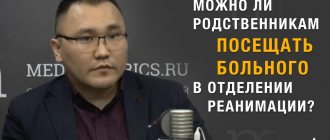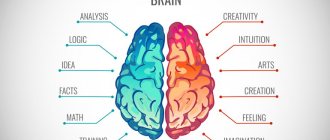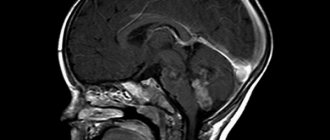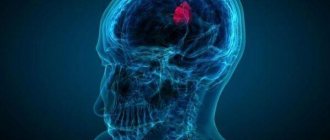Headache, nausea and vomiting, difficulty swallowing
Olga Zheludkova, pediatric oncologist of the highest category, Doctor of Medical Sciences, Professor of the Russian Scientific Center of X-ray Radiology:
“Headache - especially increasing pain - is a common symptom of a brain tumor. Usually it looks like this: I had a headache, my mother gave me a pill, a week later it happened again, a day later it happened again. Another common symptom is vomiting in the morning, which brings relief. The child gets out of bed, vomits, and feels better. Parents should be alarmed when this occurs not for the first time, but repeatedly, within a week or month. It is important to understand that ordinary gastroenterological problems, as a rule, recur every day, and vomiting with brain tumors may not be daily, but once every three days or once a week. And vomiting due to brain tumors does not fade over time, but, on the contrary, increases. Parents who notice this should urgently go to an ophthalmologist and ask him to look at the fundus and evaluate the child’s visual acuity, even if there are no obvious vision problems. And with this data, go to a neurologist. You should also be wary when there is a swallowing disorder. Usually it manifests itself as follows: while eating liquid food, the child develops coughing and choking.”
Symptoms
Signs depend on the location of the tumor and the increase in intracranial pressure. The latter factor causes headache or dizziness, nausea and vomiting. Mental disorders and convulsions in the form of seizures are not excluded.
When the cerebellum is damaged, coordination and the ability to hold the body correctly are impaired, stability is impaired, and static ataxia develops. The patient finds it difficult to maintain balance; he is forced to balance with his arms and spread his legs wide apart. Another symptom is a peculiarity of gait. She resembles a drunk woman, and her body may be abnormally straightened.
Anorexia, behavior changes, depression
Irina Tatarova, child psychiatrist, candidate of medical sciences, consultant physician at the Russian Children's Clinical Hospital:
“Parents definitely need to pay attention to sudden changes in the child’s behavior. If he becomes irritable, excitable, if he loses control over his actions, if a previously active child suddenly becomes drowsy and lethargic, you need to take him to the doctor. These symptoms should alert you if the child has not behaved this way before and if there were no apparent reasons for the change in behavior - illness, stress or severe fatigue.
Sudden mood swings can also be a cause for anxiety: causeless uncontrollable laughter or crying, euphoria turning into aggression, or sudden attacks of fear. Sometimes children with brain tumors also experience hallucinations. Young children cannot tell their parents about this, so you need to monitor their behavior. If a child suddenly freezes, his eyes widen, if he looks for a long time and points to an empty space, this is a reason to contact a specialist. Many symptoms also accompany depression. But this is not a specific symptom, which in case of brain tumors is usually combined with other manifestations of the disease.
With all these symptoms, parents often take their child to a psychologist, but first of all they need to consult with a neurologist and a psychiatrist - and it is advisable for these two doctors to work in pairs. Unfortunately, sometimes symptoms are associated with autism spectrum disorders, so it is important to contact competent specialists who will conduct a comprehensive examination of the child.
Anorexia can also be a symptom of a brain tumor. If it is caused by psychological reasons, the child consciously begins to limit himself in food, avoids dinners with his family, and looks at himself in the mirror. But if a child eats normally and suddenly begins to lose weight sharply, parents should take him to an endocrinologist.”
Convulsions, weakness, loss of consciousness
Vladimir Solovyov, neurologist-epileptologist, head of the laboratory for pre-surgical diagnosis of epilepsy at the Morozov Children's City Clinical Hospital, doctor at the video-EEG laboratory of the Epilepsy Center:
“The main neurological symptoms of a brain tumor, in addition to headaches, are seizures and loss of consciousness. Of course, anyone can faint: for example, this happens with children of asthenic physique, or with overwork and hormonal changes in the body. But if a disturbance of consciousness occurs unexpectedly, without physical activity, then this is a reason to go to the doctor. In any case, seizures should also be seen by specialists. Very young children may experience febrile seizures - seizures during fever and infectious diseases. Most likely, such seizures will not be a symptom of a brain tumor, but it is still necessary to exclude this. Well, if attacks bother children older than one year, then this is definitely a reason to consult a doctor.
Another symptom is general weakness. He should be alert if this happens systematically, if it is clear that the child is not pretending. It’s one thing when he doesn’t want to go to school in the morning, and it’s a completely different thing when you and your whole family go to the zoo, and the child doesn’t have the strength, although he always really wanted to go there.
Unfortunately, specialists do not always immediately prescribe the necessary examinations for children. In my practice, I often encounter the fact that instead of an MRI, children are referred for an ultrasound of the brain vessels. Doctors suspect vasoconstriction, which allegedly causes chronic oxygen deprivation and headaches. Some people even try to blame it on a migraine, but how can a six-year-old child get a migraine? Then the parents themselves do an MRI, and there the tumor is in an advanced stage. This also happens.
At my appointments, I always advise parents to get a second opinion, especially when it comes to a serious illness. If parents suspect something, it is better to hear from a second specialist. Moreover, if the doctor at the appointment without hesitation says that there is no need to do an MRI, that everything is fine - it’s just a headache and will go away soon. It is important to remember that even one of the above symptoms is enough to consult a specialist.”
Causes and risk factors
The exact causes of brain cancer are still unclear, but there are certain risk factors that significantly increase the likelihood of developing tumors:
- predisposition inherited from parents or other close relatives;
- work in hazardous production;
- long-term exposure to radiation;
- decreased immune system function;
- infection with Epstein-Barr virus or cytomegalovirus;
- past traumatic brain injury;
- male gender, old age, white race.
The presence of one or even several of the listed signs does not mean that a person will necessarily develop a tumor in the brain, but the risk of developing the disease for these people is increased compared to others.
Growth problems, delayed puberty or early puberty, diabetes insipidus
Nadezhda Mazerkina, endocrinologist of the highest category, Doctor of Medical Sciences, doctor of the children's department of the National Medical Research Center for Neurosurgery named after. ak. N. N. Burdenko:
“Parents should first of all be alert to the following symptoms: growth retardation, premature or late puberty, as well as symptoms of diabetes insipidus: thirst and polyuria - that is, a frequent urge to go to the toilet, especially at night. If a child has at least one of these symptoms, parents need to take him to a good endocrinologist: he should figure it out.
It is very important to pay attention to the child's growth rate. To do this, it is necessary to regularly measure growth and record it, and observe it over time. A growth rate of less than four centimeters per year is suspicious - there is a high probability that the reasons are related to hormonal disorders. You also need to monitor the appearance of signs of puberty in the child: if they appear in a girl before the age of eight, and in a boy before the age of nine, then this is a reason to consult a doctor. The same can be said about delayed puberty. You should be concerned if a girl shows no signs of puberty after 13 years, and a boy does not show signs of puberty after 14 years.
It is worth mentioning separately about obesity: in itself it usually does not become a symptom of a brain tumor, but if excess weight is combined with any of the above symptoms, this is a cause for alarm. You should also be concerned if the change in weight is accompanied by deterioration of vision or severe headaches in the child. Quite rarely, cachexia can be a symptom: sudden weight loss for no apparent reason. The child becomes very thin, even to the point of exhaustion. You need to see a doctor if your weight change is really pronounced. Many children, for various reasons, get better and lose several kilograms - in these cases, of course, it’s not worth sending them for an MRI.”
Deterioration and various visual impairments
Andrey Levashov, pediatric oncologist, candidate of medical sciences, researcher at the department of chemotherapy of hemablastosis with the neuro-oncology group of the National Medical Research Center of Oncology named after. N.N. Blokhina:
“A symptom of a brain tumor is often rapid deterioration of vision. A child may complain of various disturbances: the flickering of midges or the appearance of multi-colored highlights and stripes in front of the eyes, loss of visual fields from different sides - that is, when he ceases to see with peripheral vision, loss of central visual fields - when the child’s gaze is constantly directed to the side. It is also possible to develop photophobia (photophobia) - painful sensitivity of the eye to light.
There are a number of other symptoms of a brain tumor that should be cause for concern. These are increasing nystagmus, that is, rapid movement of the eyeballs from side to side or up and down, diplopia (double vision), exophthalmos (protrusion of the eyeball outward), ptosis (drooping of the upper eyelid so that the eye is constantly in a half-closed state). Also, with brain tumors, strabismus may develop, and sometimes the pupils begin to differ in size. The child may be bothered by pain in the projection of the eye: in this case, he will say that the eye hurts somewhere deep, something is pressing on it.
It can be difficult for parents of young children to notice visual impairment in their child. Young children cannot complain, so parents need to closely monitor their behavior. For example, if a son or daughter used to assemble a construction set, but now cannot, or if they suddenly have difficulty picking up an object that was not there before, this may indicate vision problems.
If you experience any of these symptoms, you should immediately contact your pediatrician and ophthalmologist. Next, a comprehensive examination should be carried out, including an MRI of the brain with intravenous contrast. The most important thing is timely diagnosis; it is better not to delay treatment.”
Survival prognosis
Treatment for medulloblastoma largely depends on the stage at which the cancer was discovered. Patients are divided into two groups according to survival prognosis. The first includes patients at stage T1 or T2 M0. In this case, with total radical removal of the tumor, the success of treatment is assessed quite highly; 75% of patients will live 5 years or more. In the second group, patients with T3, T4, (grade 4/grade IV) and the presence of a metastatic process of different stages, with subtotal removal of the tumor, the survival prognosis will be moderate or poor. Only 35% of patients will live more than three years, subject to adequate comprehensive treatment.
The worst prognosis is for patients with relapses or if grade 4 medulloblastoma is diagnosed. In this case, most patients will not live more than one and a half years.
Ringing in the ears, hearing loss, noticeable tilting of the head or curvature of the neck, dizziness
Andrey Levashov, pediatric oncologist, candidate of medical sciences, researcher at the department of chemotherapy of hemablastosis with the neuro-oncology group of the National Medical Research Center of Oncology named after. N.N. Blokhina:
“Symptoms of a brain tumor can also include hearing impairment. The child begins to hear worse, or he develops hypersensitivity to sound: you talk to him quietly, but it seems to him that it is very loud. Ringing in the ears can also be bothersome, often only on one side. With all these symptoms, the pediatrician, of course, can refer you to an ENT doctor, but if he rules out pathology of the ENT organs, then this is a direct route to a neurologist.
Another symptom from the ENT organs is a constant cough. It's not wet or long-lasting: I'd say it's more of a cough. In this case, they usually first contact an ENT doctor. If it excludes colds, then the child begins to suspect allergies. But allergic cough usually depends on seasonality and worries in the spring and summer, when there are a lot of allergens around. It may also depend on the presence of food, drug allergies, or allergies to pet hair. If the child’s living environment and diet have not changed, and if he has not taken medications, then a cough should cause concern.
When the tumor is located in the cervical region or the transition of the brain stem to the spinal cord, the child sometimes experiences a tilt of the head to the side or a curvature of the neck. But usually this is not the key symptom; it is combined with something else.
It is necessary to mention dizziness. If they bother your child regularly, if he complains about them, even when he’s just sitting or lying down, you need to go to the pediatrician. First, he will prescribe a general blood test, and if no signs of anemia are detected, he will refer you to a neurologist. Sometimes this symptom can also indicate dysfunction of the heart muscle or thyroid gland: in this case, a cardiologist and endocrinologist will be involved.”
Treatment of neoplasms
Previously, there was a widespread belief that stem tumors are not subject to surgical treatment due to the fact that they have an infiltrative nature and are capable of diffusely growing into stem elements.
Despite the fact that among all stem structures, most tumors have diffuse germination, sometimes there are delimited nodular formations that are easily removed. Before choosing treatment tactics and deciding on the possibility of surgical intervention, the patient needs to consult a neurosurgeon.
The preferred method of eliminating a brain stem tumor is the maximum possible resection of the tumor with minimal damage to brain structures. Microneurosurgical surgical techniques are developing and provide a chance for a higher level of treatment.
Almost 80% of brain stem tumors are considered inoperable forms. Chemotherapy and radiation treatment are used for inoperable forms, in the preoperative and postoperative period. Cytostatic agents are used in combination form for chemotherapy. 75% of patients receive symptom relief from radiation therapy. The vast majority of cases of the disease end in the death of the patient. Radioisotope treatment can prolong the life of children with similar tumors. The life expectancy of 30% of children who underwent radiotherapy increased by 2 years.
Stereotactic radiosurgery is the newest method for treating brainstem tumors. Two types of radiosurgery can be performed:
- gamma knife - a special helmet is placed on the patient’s head for irradiation from multiple points. The rays converge at one point where the tumor focus is localized. Healthy tissues are practically not affected by this effect. Each beam has a small amount of gamma energy, but the total effect of all beams contributes to achieving maximum effect.
- cyber knife - performed using a robot and is an automated procedure. The device independently concentrates radiation into the area where the tumor is located. The patient's movements and breathing prevent any confusion in aiming the beam of rays.
Studies prove the validity of these methods in the treatment of benign neoplasms up to 3.5 cm in size.
Developmental delay, developmental regression, increased head circumference
Olga Zheludkova, pediatric oncologist, Doctor of Medical Sciences, Professor of the Russian Scientific Center of Radiology:
“In young children, up to two years old, a brain tumor, as a rule, does not manifest itself in any way. And the only symptom is an increase in head size. Therefore, parents should pay attention to this, and if they notice that the head circumference continues to increase rapidly, they need to go to the pediatrician and tell them about it. Also, a manifestation of the tumor process can be a reverse development: when the child developed and gained weight up to six months, everything was normal, but after six months of age he ceases to be interested in the world around him and objects, stops sitting and walking, and holding his head up. Although he eats well, for example. This could also be a symptom of a brain tumor."
Recorded by: Liza Kofanova, Victoria Vyakhoreva










